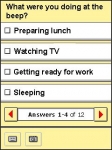Oct 19, 2005
Knowledge management software for neuroscientists
Via Neurodudes
Neuroscholar is a KM software application for neuroscientists, which allows to store and annotate primary research data in conjunction with information from the literature (below a preview of the program's graphical user interface).

More to explore
The Neuroscholar demo can be accessed here.
The Neuroscholar source code can be downloaded from here.
Burns, G. A. (2001). Knowledge management of the neuroscientific literature: the data model and underlying strategy of the NeuroScholar system. Philos Trans R Soc Lond B Biol Sci 356(1412): 1187-208.
Burns, G., K. Stephan, B. Ludäscher, A. Gupta and R. Kötter (2001). Towards a federated neuroscientific knowledge management system using brain atlases. Neurocomputing 38-40: 1633-1641.
15:20 Posted in Research tools | Permalink | Comments (0) | Tags: Positive Technology, research tools
Oct 11, 2005
The Whole Brain Atlas
The Whole Brain Atlas has been awarded the Scientific American Science and Technology Web Awards 2005
The site is an information resource for central nervous system imaging which integrates clinical information with magnetic resonance (MR), x-ray computed tomography (CT), and nuclear medicine images.  The site presents high-resolution images of various types of strokes, tumors, degenerative disorders and infectious diseases as they affect the brain over time.
The site presents high-resolution images of various types of strokes, tumors, degenerative disorders and infectious diseases as they affect the brain over time.
Another award has gone to Mind Hacks, a blog that reports on the latest developments in neuroscience, taking a fun approach to dissemination.
17:25 Posted in Research tools | Permalink | Comments (0) | Tags: Positive Technology, research tools
Sep 24, 2005
Open-Source Context-Aware Experience Sampling Tool
Ambient Intelligence (AmI) systems can be viewed as environments in which people will increasingly live their lives. Ubiquitous AmI technologies and systems like personal digital assistants, wearable sensors, mobile phones challenge traditional usability evaluation methods, because use context can be difficult to recreate in a laboratory setting. This view suggests that the evaluation of user’s experience with AmI systems should take place in realistic contexts, such the workplace, the home, etc. Another issue has to do with the content of the evaluation. Performance-based approaches are not suitable for AmI systems, because it is difficult to specify tasks that capture the complexity of real world activities. Moreover, experience is idiosyncratic, in that it is related to the specific bio-cultural configuration of each individual, and it can undergo changes throughout individual life and daily situations.
 The Experience Sampling Method (ESM) offers a new perspective in the analysis of these issues. ESM is based on the online repeated assessment of individual behavior and experience in the daily context. Participants describe themselves and their environment while interacting with it. They carry with them for one week an electronic beeper and a booklet of self-report forms. Whenever they receive an acoustic signal, they are expected to fill out a form. The form contains open-ended questions about situational variables such as place, activities carried out, social context, and subjective variables such as the content of thought, perceived goals, and physical conditions. The form also contains 0-12 Likert-type scales investigating the quality of experience in its various components: affect, motivation, activation, and cognitive efficiency.
The Experience Sampling Method (ESM) offers a new perspective in the analysis of these issues. ESM is based on the online repeated assessment of individual behavior and experience in the daily context. Participants describe themselves and their environment while interacting with it. They carry with them for one week an electronic beeper and a booklet of self-report forms. Whenever they receive an acoustic signal, they are expected to fill out a form. The form contains open-ended questions about situational variables such as place, activities carried out, social context, and subjective variables such as the content of thought, perceived goals, and physical conditions. The form also contains 0-12 Likert-type scales investigating the quality of experience in its various components: affect, motivation, activation, and cognitive efficiency.
Intille and colleagues at MIT have recently developed a Personal Digital Assistant-based version of the ESM which can be used for user-interface development and assessment of ubiquitous computing applications. This approach, called Context-Aware Experience Sampling, includes the possibility to assess user’s experience not only through the standard time-based protocol, but also according to the participant’s location, by means of information provided by a GPS plug-in. Thus, researchers can design experiments collecting self-reports only when the participant is near a location of interest. Moreover, users can answers via audio recording or by taking a picture with a camera.
More to explore
S. S. Intille, J. Rondoni, C. Kukla, I. Ancona, L. Bao, A context-aware experience sampling tool, CHI Extended Abstracts 2003, 972-973.
Gaggioli, A., Optimal Experience in Ambient Intelligence (2005), in Ambient Intelligence, Riva, G., Vatalaro, F., Davide, F., Alcañiz, M. (Eds.), Amsterdam: IOS Press. PDF
10:00 Posted in Research tools | Permalink | Comments (0) | Tags: Positive Technology, research tools
Sep 09, 2005
International Journal of Human-Computer Studies - Special issue on computer support for creativity
October issues (4-5, Pages 363-536) of the International Journal of Human-Computer Studies focus on the different ways that computers can be involved in creative work.
The journal covers research in computing, artificial intelligence, psychology, linguistics, communication, design, engineering, and social organization, which is relevant to the design, analysis, evaluation and application of innovative interactive systems.
11:15 Posted in Creativity and computers | Permalink | Comments (0) | Tags: Positive Technology, research tools
Sep 07, 2005
The Blue Brain Project
The “Blue Brain” project, a collaboration between IBM and the Ecole Polytechnique Fédérale de Lausanne (EPFL), aims to create the first computer simulation of the circuitry in the neocortex, which is the largest and most complex part of the human brain, down to the molecular level. 
For the project, IBM will use the latest installation of IBM's BlueGene/L system running on Linux. EPFL's supercomputer uses 8.000 CPUs and has a peak speed of 22.8 teraflops (22.8 trillion calculations every second) putting it among the the world's top 15 supercomputers. The simulation code will be based on NeoCortical Simulator, an open source software running on Linux developed by Dr. Philip Goodman's.
Using the digital model generated by Blue Brain, scientists hope to shed light on complex cognitive processes such as thought, perception and memory, and to understand more about mechanisms responsible of brain malfunction.
More to explore
IBM Research Blue Gene Project Page
10:55 Posted in Research tools | Permalink | Comments (0) | Tags: Positive Technology, research tools
Jul 26, 2005
Faculty psychologist job position at Emory using VR
Via VRPsych list
Faculty Psychologist - Emory University School of Medicine, Department of Psychiatry and Behavioral Sciences announces a full time assistant professor position. Job duties include working on an NIMH-funded study exploring medication and virtual reality exposure therapy, administering CBT, program development, and supervision. Requirements: doctoral degree, APA approved internship, CBT experience, supervised postdoctoral year, and Georgia licensed or license eligible.
Application deadline 9/1/05 or until filled.
Send CV, letter of interest, publications, and 4 letters of recommendation to Barbara O. Rothbaum, Ph.D., ABPP, Psychiatry, The Emory Clinic, 1365 Clifton Rd, Atlanta, GA 30322.
17:10 Posted in Research institutions & funding opportunities | Permalink | Comments (0) | Tags: Positive Technology, research tools






